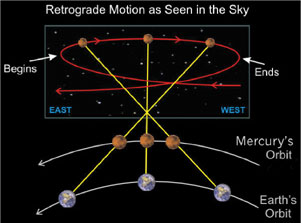By
John Townley, August 2015
“Oh,
you can’t do that when Mercury is in retrograde!” is a phrase
that should
make you cringe, not only from its improper English (it’s
just “retrograde”,
not “in retrograde”), but from its misunderstanding
of what retrograde is
physically and what it means astrologically. It has become a catchall
pronouncement
that generally implies messed-up, backwards, confused, entangling, and
generally to be avoided. In fact, it means no such thing, either in
natal
horoscope or as a sky transit, yet it does describe something
meaningful and
useful in both, so it might be good to stand back and take another look
at the
retrograde phenomenon. Especially since at least one planet is
retrograde in
the sky nearly all the time, on average two or three.
We’ve described the orbital
mechanics of retrogradation in our Retro
Rhythms,
and touched on its tidal qualities in Retro Tides
and The
Breathing Tide, but
we could talk a bit more about what’s been
traditionally missed and why, once you’ve got a good grip on
the phenomenon
itself, especially regarding the space in the sky a retrograde planet
traces
(the “shadow”, among other terms applied). And,
it’s important to differentiate
retrogrades of planets outside the Earth’s orbit (Mars
through Pluto) and those
interior to it (Mercury and Venus).
The
most important illusion to disperse is that a retrograde
planet is somehow lost and distant from us. Quite
the
opposite is true. The retrograde period occurs when we are the closest
in our
orbit to a planet, when we are speeding past them (or for Mercury and
Venus,
they are speeding past us) so fast that they look like
they’re going backwards
(and from their point of view, we look the same way). So, if anything,
it’s a
period of more active engagement, gravitationally and by sheer
proximity. A retrograde
planet is literally in our face, as much as it can get, with all that
implies.
It demands our attention, and it only becomes a problem if we ignore it
or
avoid it (which has been our first inclination, traditionally).


As
we pass by another planet, we're just adjusting mutual speed and
proximity, like ships alongside, ideal for interchange.
It’s
similar to the difference between rushing past oncoming
traffic and being overtaken by a vehicle in the adjacent lane. Any
driver knows
the greatest and longest risk comes from an encounter with the latter.
Similarly, in the air or at sea, one is like ships passing in the night
with
barely a chance for a glance, the other an extended opportunity for
refueling,
exchange of cargo, and mutual communication with another vessel, a
moving
rendezvous before pulling away after the close engagement.
Of
course, whether it’s of much difference or any use it
depends on how relatively close you’re getting, compared with
how far away
you’ve been, and how fast you’re both going. We get
an average 93,000,000 miles
(our orbit’s diameter) closer than our farthest point from
any given planet
outside our orbit, starting with Mars. On the inside, for Mercury
it’s about
35,000,000, for Venus 67,000,000. When the planet is relatively nearby
(like
Mars or Venus), that’s a big chunk of the average distance
between the two of
us, so it matters, and it takes us only a few weeks to overtake (or be
overtaken by) our neighbor, then pull away…and then
it’s back to business as
normal. In the case of Venus, it takes six weeks, faster Mercury only
three
weeks, and slower Mars a whole two months, and all three appear to go
backwards
against the sky background for about fifteen degrees during the retro
period.


Mercury and Venus cut a
15-degree swath, and if you've a planet in the midst (as Sun, r.), it
pulls you in more.
But
if the planet in question is really far away, with a
much wider orbit, then our 93,000,000 miles back-and-forth difference
is a
relative drop in the bucket, and our orbit doesn’t really
bring us all that
closer (or farther away), and the resulting retro period is much, much
longer,
from four months for Jupiter to almost half the year for Pluto, and the
retrograde distance traversed is much smaller (ten degrees for Jupiter,
only
about one or two for Pluto. That’s a big difference, and a
reason we tend to
notice and talk about the retro Mercury, Venus, and Mars, and not the
middle
and outers so much. With the outers, it’s more like a shallow
tide going in and
out, as they inch along – although closer Jupiter and Saturn
retro vs. direct
periods have palpable socio-political effects – whereas with
those right next
door, it’s a much bigger deal individually and personally.

 Mars
(l.) and Jupiter have
longer retro periods, but fewer degress are covered in the process.
Mars
(l.) and Jupiter have
longer retro periods, but fewer degress are covered in the process.
And that’s just the physical
end. Astrologically, when our
neighbors go retro, they trace, retrace, and retrace again a swath of
degrees
that are thus getting triple attention. In Mercury’s case, it
reverses for
three weeks over just fifteen degrees, eventually hitting each degree
three
times (in about five weeks overall), so that’s a lot of
personal attention to a
select few. In Mars and Venus’s cases, it’s about
the same number of degrees,
but they take longer to do it (Mars two and a half months retro, total
four and
a half months in all, Venus six weeks retro, two and a half months in
all)
though it happens less often. And it’s not just hits to your
natal horoscope,
should some of your degrees be there – it’s also
initiating a whole set of
interrelated of events (births, launches, decisions) that are long-term
directly connected to each other in an extended-family
sort of way, and to you if your natal degrees are in the mix, well down
the
line. So, it’s sort of a group-intensive involving
considering, reconsidering,
and then
finalizing of subjects and life areas covered by the planet involved,
with rolling repercussions.

 Pluto (2016-17), and the
other distant outer planets, can retro over the same degree for more
than a year, more like hovering.
Pluto (2016-17), and the
other distant outer planets, can retro over the same degree for more
than a year, more like hovering.
What’s
happening here is, in sound and film-editing terms, a
scrub, where you roll back and forth over an edit/splice point to get
it precisely
right, especially in the case of the inner and middle planets. [NB:
because the
three outermost planets move so slowly, their retrograde courses
overlap some
spots two years in a row, giving some degrees six hits instead of the
usual
three, so they appear more to hover than scrub.]. And that’s
pretty much what
you should be doing during a retro – paying close attention
to needed fixes and
readjustments and not just taking time off until it’s over.
Those who spend the
time with their eyes and minds open profit from the effort, those who
don’t
miss the boat, if not right away then down the line when that
period’s inevitable
developments begin to unfold.

 Scraping back
and forth over the same degrees, planets do what tape editors call
"scrubbing", fine-tuning a specific spot.
Scraping back
and forth over the same degrees, planets do what tape editors call
"scrubbing", fine-tuning a specific spot.So
what to do, when something’s retrograde? Basically,
it’s
time to take another look. Well, yet
another look, as it happens regularly. It’s the opportunity
to get intimate
with it again, a renewal of vows if you will, since you’re
married to it regardless.
With Mercury, it’s simple restructuring of your intellectual
efforts, and with
Venus, a longer re-estimation of what you want and what you really
don’t. And
Mars? That tends to be the most frustrating, as it’s a time
when you generally
move ahead, yet just keep meeting with snafus. Reorder your energies,
don’t
push against stubborn obstacles, take another road that is less crowded
and
fractious, requires less confrontation, where you can get some speed on.
But
all in all, the main action message of retro periods
should be paying attention and digging into the changes, not waiting
until the
variable period passes. Get it right while that’s happening
and you’ll be ahead
of the game, ignore it and those who have been attentive will begin to
outdistance you as soon as the retro period passes.

